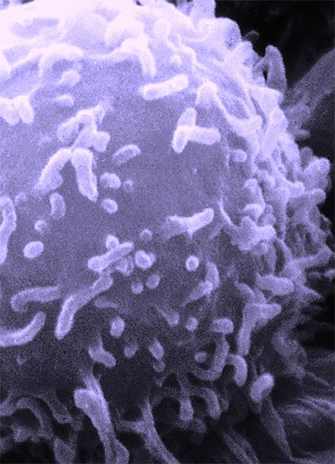One of the ongoing challenges in cancer treatment is finding ways to increase the benefits of chemotherapy and reduce the negative side effects: simply put, it is to figure out how best to eliminate cancer cells while protecting healthy, essential cells. An emerging class of drugs that aims to tip the scale favorably includes antibody-drug conjugates (ADCs) – uniquely engineered compounds that use antibodies to bind and deliver chemotherapy to cancer cells while sparing healthy cells. Think of them as highly targeted biomolecular missiles.

To advance research and development of ADCs, Derek Wilson, associate professor of chemistry in the Faculty of Science, in partnership with ImmunoBiochem Corporation, recently received an Engage Grant from the Natural Sciences and Engineering Research Council and the Ontario Centres of Excellence. Engage Grants allow researchers to launch a new research collaboration with an industry partner on a short-term project that applies their expertise to address a company challenge.
“Academic and industry collaborations help tackle the ‘innovation gap’ between fundamental scientific discovery and commercial application,” says Ray Jayawardhana, dean of the Faculty of Science. “In addition, applied research results often raise new fundamental questions that feed back to advance basic science. Congratulations to Derek on receiving this important grant.”
ImmunoBiochem has developed a promising group of ADCs that work through an innovative delivery mechanism and are aimed at proteins secreted by cancer cells. The company is seeking a high-throughput approach to systematically discover new targets for which this class of ADCs could be developed.
Enter Wilson and his lab. As director of the Centre for Research in Mass Spectrometry, Wilson is developing novel mass-spectrometry methods to investigate biomedical problems at a molecular level. For instance, he is using these methods to study the causes of neurodegenerative diseases like Alzheimer’s.
With the new Engage Grant, Wilson will work closely with ImmunoBiochem to develop a mass spectrometry-enabled method that can be used to discover new cancer targets for the company’s ADC platform.
“This work will allow us to make significant contributions to the new field of ADCs, a class of therapeutics that has recently demonstrated significant clinical promise,” says Wilson. “I’m excited to enable ImmunoBiochem’s unique ADC approach and their development of highly selective therapeutics.”
“Dr. Wilson and his group bring cutting-edge expertise to this target discovery work,” says Anton Neschadim, CEO of ImmunoBiochem. “The results of this collaboration will further our efforts to address an unmet clinical need in oncology with innovative biologics, particularly in very challenging indications such as triple-negative breast cancer. We thank OCE and NSERC for their support.”
To learn more about Wilson’s research, visit his lab page.


